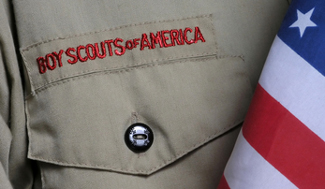LA Times Unveils Database of Boy Scouts' Files; Top Oregon Court Order May Spark New Civil Cases

Image from Shutterstock.
As an Oregon Supreme Court ruling earlier this year took effect on Thursday, making more than 1,200 ‘ineligible volunteer’ files maintained by the Boy Scouts of America public, the Los Angeles Times unveiled a comprehensive database of these files and more.
Dating back to material from the late 1940s, and as recently as January 2005, the database includes not only the files, from 1965 to 1985, covered by the Oregon Supreme Court order but an additional 1,900 files from 1970 to 1991 produced in discovery in response to a 1992 California lawsuit and a summary of 3,100 additional files that the newspaper received from Timothy Kosnoff, a plaintiff’s attorney in Seattle, the Times explains in a database note. Some of the material overlaps, and much of it contains sexual abuse allegations against volunteers—some 5,000 men and a very small number of women—that never resulted in criminal charges, let alone convictions.
As a post on the newspaper’s L.A. Now blog explains, victims’ names have been redacted but those accused have not. The files contain police reports, handwritten accounts by children who say they were victimized, court records and correspondence among officials of the Boy Scouts, among other material.
Some files show that allegations were not reported to police and provide support for claims that accused volunteers were shielded by the organization, the newspaper says, noting that legal experts have said such material could be a basis for potential civil litigation. In a transcript of earlier NPR news coverage, a reporter says it is too late to pursue criminal charges concerning most of the claimed victims.
Multiple news organizations provide detailed information about what is contained in the files and allegations concerning the Boy Scouts, including CNN, the New York Times (reg. req.), NPR and Reuters.
“We failed some of our kids and we have to say we’re sorry,” Boy Scouts of America President Wayne Perry told Reuters. “There are cases where we failed to live up to our standards, failed to properly document cases, and fell short in other ways.”
Among the material in the files, the New York Times recounts, is an August 1981 letter from a Colorado father of three Boy Scouts who said a local leader known as “Joe” had molested a number of boys, including the writer’s own son, yet had been seen at an organization Jamboree wearing a nametag just like other scoutmasters.
“Your assurances that Joe was out of scouting and would have no further contact with scouting have just become meaningless,” the man wrote. “Do you care about my distress over watching Joe insidiously get back?”
The Boy Scouts organization reportedly has kept files on volunteers since at least 1919 in an effort to prevent suspected pedophiles from victimizing children, but didn’t always follow up aggressively on suspected abuse. An unknown number of files have been destroyed.
Current policy requires the Boy Scouts to conduct criminal background checks, notify police even when child molestation is suspected and have leaders work with participants in teams of at least two. The organization also provides training to help its leaders spot possible signs of abuse.
Earlier coverage:
ABAJournal.com: “Lawyers for Boy Scouts, Corporations & Media Argue About Whether ‘Perversion Files’ are Public”
ABAJournal.com: “Top Oregon Court Says Much, But Not All, of 1,247 Boy Scout ‘Ineligible Volunteer’ Files Are Public”



